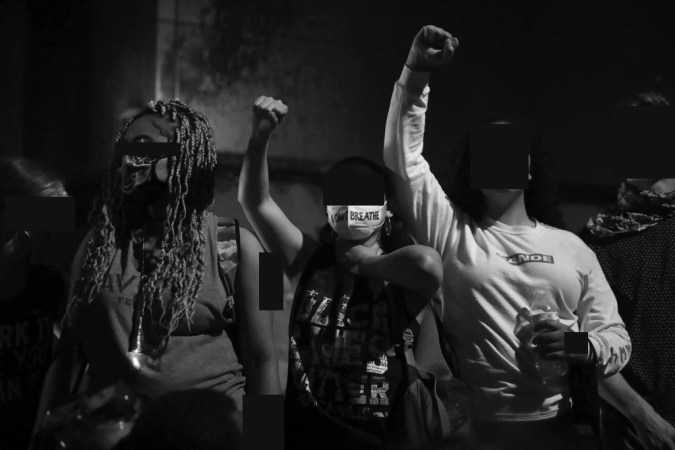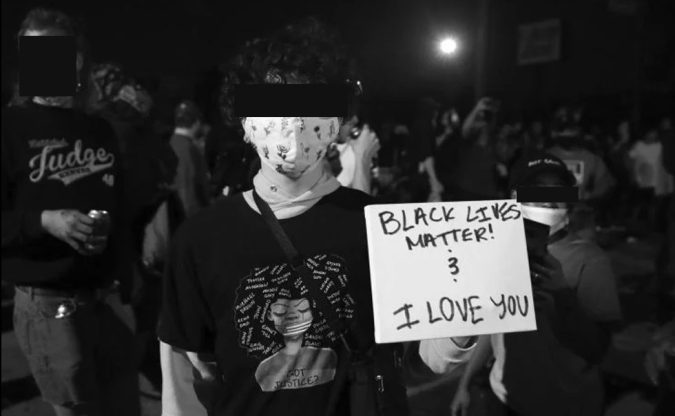You can read this text in Spanish here.
There are pivotal moments in movements, and now that we are living in one, it’s odd how evident and out-of-body its unfolding can feel in the present. Many of us woke up with heavy minds and hearts every day of this week following the death of George Floyd—a Black man deemed a “gentle giant” who was always cheerful. He was killed at the hands of a White cop who was also his former co-worker at a Latin club.
That familiar grief was followed by an acute, warranted fear thanks to the leader of the “Free” World’s white nationalist, violence-inciting rhetoric on Friday. For others, this week was more of a realization that they are a part of the problem.
This moment is both a seedling of a potential mass-scale reckoning and revolution—both of which pose a question to us all: What will be your position in this moment in history?

There is beauty not only in our similarities but our differences (be it in background, education, location, etc.), as well.
“It’s terribly important to know that there is no revolution without evolution,” Afro-Peruvian artist and activist Victoria Santa Cruz once said.
Brown and Black solidarity within and outside of the Latino umbrella has solidified slowly yet naturally throughout the last century. There are beautiful, and also many unfortunate, similarities in the way our stories have unraveled and also the way in which they are told.
On the one hand, when senseless murders occur at the hands of systems and people who were taught to hate us for the differences between our melanin-heavy and their milky skin, images—think Óscar Alberto Martinez Ramirez and his 23-month-old daughter Angie Valeria or George Floyd with Derek Chauvin’s knee on his neck—are circulated, further dehumanizing the avoidable occurrence.

On the other, there’s the history of coming together for common causes. We most suffer from the consequences of racist-at-their-core systemic issues like mass imprisonment and inequality. At the same time, there are issues and perspectives that are not one and the same—think ways in which our ancestors ended up on this and/or Latin American land. But, that’s where the opportunity to learn from each other and share healthy rage which coalesces into further organized uprising stems from. There is beauty not only in our similarities but our differences (be it in background, education, location, etc.), as well.
The War on Poverty in Los Angeles or the strong union between the Black Panther Party and United Farm Workers in the 1960s and ‘70s are a couple of examples that come to mind. Every time, each fights for the other’s plight as if it were their own (because it so often is) and there has always been a melding of minds and spirits there.
That often conjoined passion lies in the fact that there is a shared history of repression and often unfair conditions of livelihood that are a circumstance of “coloniality of power.”


“When we worked with farmworkers, it wasn’t just a year… it was an everyday thing because the struggle is every day,” said Bill Jennings, a former member of the Black Panther Party from 1968 to 1974. “We learned from each other.”
Further expansion of that circle of unity calls for the end of a no longer permissible silence from the White counterparts of our decided whole as Latinos.
Furthermore, it requires Latinos (of all races) to confront themselves and their families’ foundational truths as well. Has assimilation to Anglo-American ideas on everything from beauty to religion skewed your perspective? Do you understand the difference between race and ethnicity? Are you racist/do you stay quiet as others exhibit racist tendencies?

As we evolve in some ways, we must also devolve in others and wrestle with unraveling tightly-woven-in, harmful thought patterns. Are you willing to unlearn and learn (not at the mental and/or emotional expense of others, but through your own blood, sweat and tears)?
“Hispanics” are the largest minority in the United States. About 65% of those who self-identify as Hispanic or Latino also identify as White. Though White Latinos are loudly heard in elite spaces, newsrooms and more, that is not so much the case when it comes to the necessary fight for equality and against racism.
Although non-Black POC can and do go through similar battles (depending on familial ties and background), the struggles of the Black, Brown and White Latino communities have never been the same nor are we one-dimensional. This moment, no matter where on the spectrum of race you find yourself or identify with requires more of us all.

“I tell him to be careful… if a cop stops him, they won’t know if he’s Latino or Black,” I recently heard someone utter regarding several nuggets of well-intentioned pieces of advice they told an adult son some time ago. The reality of Kiko’s* identity and experience, though, is that he is both Black and Latino—a fact that has been the case since birth, yet somehow still not evident to his mom, and perhaps even himself.
For Black Latinos who haven’t dug deep, this moment is an opportunity for acknowledgment and acceptance of duality. For Brown Latinos, it’s an opportunity to continue a rich history of solidarity, not only in words but in action, acknowledging that the forced taking of land and breath both on U.S. land and the rest of “America”—north, central and south—does not discriminate. For White and other Latinos, it is a moment to grow in knowledge and speak/act boldly in favor of Black people.
If there ever was a moment to apply the same level of vehement patriotism and Latino-pride that we as a community so often do, to a cause and plight—it is now.

“Radical simply means ‘grasping things at the root,’” author and activist Angela Davis once said. Such uprooting cannot take place without collective action: “we need to encourage a lot more cross-racial organizing.”
The last 24 hours have penned a new chapter in the history books that will inevitably result from the (& I’ll put this delicately) shitshow that is the now. There is a before and after this moment, hopefully—not only in who we’ll be individually and collectively after the pandemic ends (remember that?), or what we’ll make of/how we’ll experience art—but, more generally, what kind of “normal” we wish to walk into if we do, and what we’ll deem acceptable.
This week, thousands of people across the United States have shown up to protest despite the coronavirus pandemic. Artists have donated and shared images. Meanwhile, familiar and consistent voices like Alexandria Ocasio-Cortez and Cardi B have chimed in.
Read a book or 50 to get a glimpse of the centuries that have led to this uprising as well as the many that came before.
As we move forward, the voice of ally and creative polymath Rihanna comes to mind:
“We can’t let the de-sensitivity seep in… When we’re marching and protesting and posting about the Michael Brown Juniors and the Atatiana Jeffersons of the world, tell your friends to pull up.”
Pull up.
Text FLOYD to 55156, donate to his family’s GoFundMe, the Minnesota Freedom Fund, on-the-ground media collective of the people, Unicorn Riot, and more—and after you’ve done all of that, be sure to also reckon with your demons and acknowledge or further grapple with the perhaps deeply-seeded racism, ethnocentrism or colorism at your core and consciously, respectfully engage with apathetic or misinformed family members rather than ignore their comments. Read a book or 50 (a few suggested texts here and here) to get a glimpse of the centuries that have led to this uprising as well as the many that came before. In other words, take responsibility for yourself and do the work—not only when it is performative or visible to your followers and peers but, especially and most importantly, when it is not.




